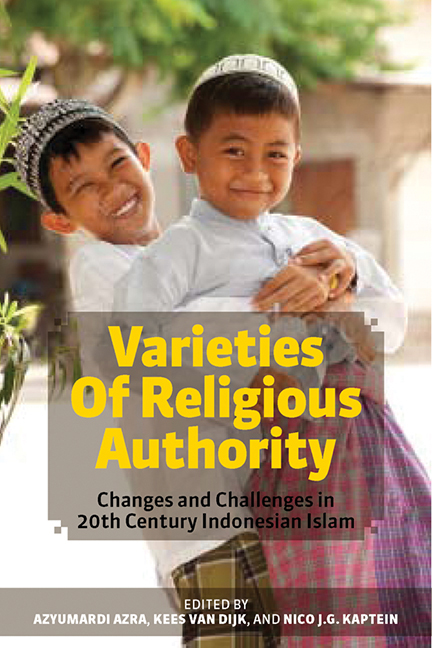Book contents
- Frontmatter
- Contents
- About the Contributors
- Acknowledgements
- Introduction
- 1 The Redefinition of Religious Authority among South Asian Muslims from 1919 to 1956
- 2 Understanding Al-Imam's Critique of Tariqa Sufism
- 3 Traditional Islam and Modernity: Some Notes on the Changing Role of the Ulama in Early Twentieth Indonesia
- 4 The Role and Identity of Religious Authorities in the Nation State: Egypt, Indonesia, and South Africa Compared
- 5 Authority Contested: Mathla'ul Anwar in the Last Years of the New Order
- 6 Struggle for Authority: Between Formal Religious Institution and Informal-local Leaders
- 7 The Indonesian Madrasah: Islamic Reform and Modernization of Indonesian Islam in the Twentieth Century
- 8 From Apolitical Quietism to Jihadist Activism: “Salafis”, Political Mobilization, and Drama of Jihad in Indonesia
- 9 From handling Water in a Glass to Coping with an Ocean: Shifts in Religious Authority in Indonesia
- 10 Religious Authority and the Supernatural
- Index
10 - Religious Authority and the Supernatural
Published online by Cambridge University Press: 21 October 2015
- Frontmatter
- Contents
- About the Contributors
- Acknowledgements
- Introduction
- 1 The Redefinition of Religious Authority among South Asian Muslims from 1919 to 1956
- 2 Understanding Al-Imam's Critique of Tariqa Sufism
- 3 Traditional Islam and Modernity: Some Notes on the Changing Role of the Ulama in Early Twentieth Indonesia
- 4 The Role and Identity of Religious Authorities in the Nation State: Egypt, Indonesia, and South Africa Compared
- 5 Authority Contested: Mathla'ul Anwar in the Last Years of the New Order
- 6 Struggle for Authority: Between Formal Religious Institution and Informal-local Leaders
- 7 The Indonesian Madrasah: Islamic Reform and Modernization of Indonesian Islam in the Twentieth Century
- 8 From Apolitical Quietism to Jihadist Activism: “Salafis”, Political Mobilization, and Drama of Jihad in Indonesia
- 9 From handling Water in a Glass to Coping with an Ocean: Shifts in Religious Authority in Indonesia
- 10 Religious Authority and the Supernatural
- Index
Summary
Many topics have been discussed by staff, researchers and visiting exchange fellows of the “Islam in Indonesia: the Dissemination of Religious Authority in Twentieth Century Indonesia” programme. In accordance with the subdivisions of the programme, their studies were clustered around four main themes: ulama and fatwa; tarekat; education; and dakwah. The results are diverse. Some scholars have focused on Islamic education and the changing role of the ulama in Indonesian society. Other research has concerned the issuing of fatwa and the impact of such authoritative rulings on society at large and on specific organizations or religious communities. Other topics pursued have been the importance of the Middle East for religious developments in Indonesia; the Shia community in Indonesia; the role of Islam in early nationalism; and individual Islamic organizations from the moderate to the radical, and those in between. As planned, two conferences have already been held; one on fatwa, the other on dakwah, and this gathering is the third, concluding one of the programme. The researchers affiliated with the programme were also present at many other scholarly meetings. Dr Nico Kaptein has calculated that they have participated in more than a hundred seminars and conferences in Indonesia, the Netherlands and elsewhere in the world.
Much of the research carried out within the framework of the programme has been of a sociological or historical nature. This may be one of the reasons why the spiritual factor has not been a main topic of research and has been touched upon only in the passing; unavoidable as in many instances it is to mention God-given and sanctioned authority and correct behaviour. In a sense we have, so to speak, forgotten God. Nevertheless, in Islam the rewarding and punishing God is the ultimate religious authority. For some Muslims, He is so in a very direct and concrete way. A striking example is provided by the well-known case of the stoning of a member of the Laskar Jihad found guilty of raping a thirteen-year-old girl in Ambon in March 2001.
- Type
- Chapter
- Information
- Varieties of Religious AuthorityChanges and Challenges in 20th Century Indonesian Islam, pp. 177 - 202Publisher: ISEAS–Yusof Ishak InstitutePrint publication year: 2010

